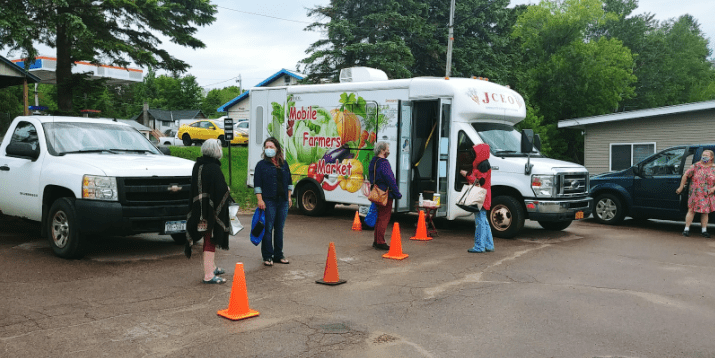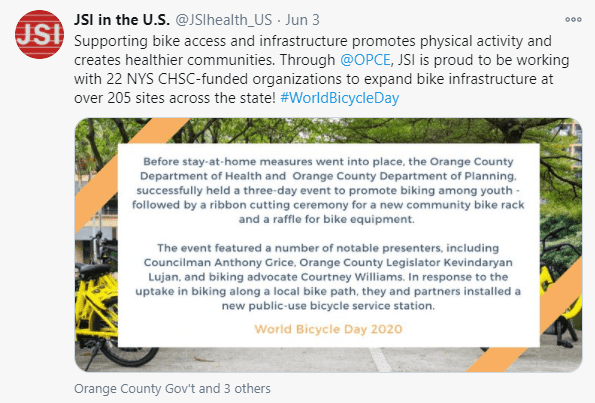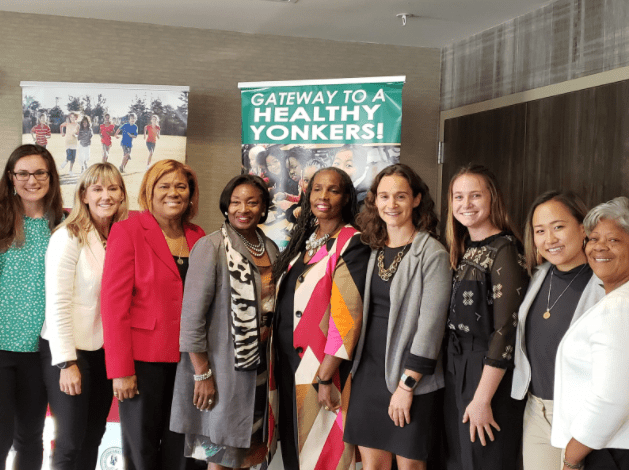Using Human-Centered Design to Create a Healthier New York
November 20th, 2020 | story
Community context and readiness are important for creating environments that are conducive to healthy lifestyles. When the New York State Department of Health (NYSDOH) contracted with JSI in 2015 to serve as the Obesity Prevention Center for Excellence, we leveraged human-centered design to provide training and technical assistance (T/TA) for the 25 Creating Healthy Schools and Communities (CHSC) grantees.
Human-centered design enlists those who know their communities best and prioritizes the voices of the people who are most affected throughout all phases of T/TA. Human-centered design fosters innovation, prioritizes learning, and puts clients and beneficiaries at the center of solutions.
Drawing on these principles, we collaborated with grantees, NYSDOH, and local, regional, and national partners to deliver services that helped build capacity, strengthen collective impact, and ensure the sustainability of grantee efforts in 85 high-need school districts and communities. In reflecting upon our experience over the last five years, we identified the following T/TA approaches as integral to the success of this project.
“[JSI has] given me opportunities to learn from my peers’ successes” – CHSC grantee
We found that grantees were often their own greatest source of inspiration. To facilitate knowledge transfer and the dissemination of best practices across grantee organizations, we held brainstorming calls, facilitated communities of practice, and shared successes through a monthly e-News.
Our webinar-style spotlights gave grantees the opportunity to hear from their peers about projects that were particularly successful. During one, a grantee presented lessons learned throughout the development and roll out of its mobile food market. Another grantee was so inspired that it started a local mobile food market of its own. The two grantees remain in touch and share best practices for their respective food-access programs.

“[JSI has supported us by] responding quickly and comprehensively to individual requests for assistance, compiling and offering useful resources, providing opportunities for learning both with peers and content experts.” – CHSC grantee.
Trainings were most effective when grantees were involved in design and delivery.
During monthly check-in calls at the beginning of the COVID-19 pandemic, grantees conveyed their struggles to advance CHSC deliverables, equip partners with resources, and communicate with stakeholders about the importance of supporting access to healthy food and physical activity during such a challenging time. In response, we held a number of virtual trainings, and developed one-pagers, sample social media posts, resource spreadsheets, and more. When asked if our T/TA was responsive to the unique challenges of advancing CHSC deliverables during a pandemic, 81% of grantees who answered agreed or strongly agreed.
Bring in the experts
“I think [my mentor] has some really good insights into what we’re doing in rural communities. Having the Department of Transportation on my team will help my community and other local communities because [the woman working with the Department of Transportation] is learning all of this stuff through the [Walking College].” – CHSC grantee
We engaged local, regional, and national experts to support grantees in the implementation of their work. These external partners have continued to support and guide grantees, and many have remained actively involved in grantee projects.
An example of one of these partnerships was our collaboration with America Walks to develop the first-ever New York State (NYS) Walking College during years 4 and 5 of the grant. As part of the NYS Walking College, CHSC grantees and their community partners developed and implemented collaborative action plans to enhance Complete Streets work with a focus on anti-racism, infrastructure, and policies. Each team was paired with a mentor who was a professional in the realm of Complete Streets, greenways, open space, active living, and alternative mobility projects. When surveyed, 76% of respondents reported that their skills and capacity to perform Complete Streets-related activities had increased. Ninety-seven percent indicated that they were likely to use the information presented during the Walking College in their day-to-day work.
“[JSI] helped to amplify our efforts to get the word out about successes we had in the field.” – CHSC grantee
Grantees reported their successes to the media with the hope that greater recognition would increase their visibility and allow them to garner and leverage resources, as well as establish credibility and trust within their communities. JSI supported the dissemination of these successes whenever possible through Twitter and by creating engaging videos.

By the end of the grant, we developed 22 CHSC videos that have a total of 636 views on CHSC’s YouTube channel. We published a blog post and a manuscript in the CDC’s Journal of Preventing Chronic Disease to show grantees’ persistence throughout the COVID-19 pandemic to meet the needs of their communities.
In addition to conveying successes through our independent communication channels, grantees frequently sought help from us to develop resources for community members, stakeholders, and local decision-makers. During the last year of the grant, we completed 98 TA requests, over half of which were associated with communicating successes via resources such as infographics, one-pagers, informational materials, and formatted presentations.
“Having worked on previous NYSDOH grants without TA, I can truly say that the trainings, resources, and networking opportunities [JSI] has provided over the past five years have proven invaluable. It feels like I’m part of a larger team, as opposed to working all alone in my corner of the state.” – CHSC grantee

Trust is the foundation of every partnership. By facilitating collaboration and connection and remaining responsive to grantee needs, we developed relationships with CHSC grantees that were critical to downstream success. In the final evaluation, 92% of respondents agreed or strongly agreed that they trusted JSI staff. When asked whether having an external agency charged with providing T/TA was significant to the success of their CHSC work, 81% of grantees agreed or strongly agreed.
By centering grantees in the design of our T/TA, and enlisting critical supports along the way, we were able to have a much greater, sustainable impact. We are honored to have collaborated with NYSDOH, CHSC grantees, and external partners around the U.S. for the last five years to increase access to and demand for healthy food and opportunities for physical activity in schools and communities across New York State.
We strive to build lasting relationships to produce better health outcomes for all.